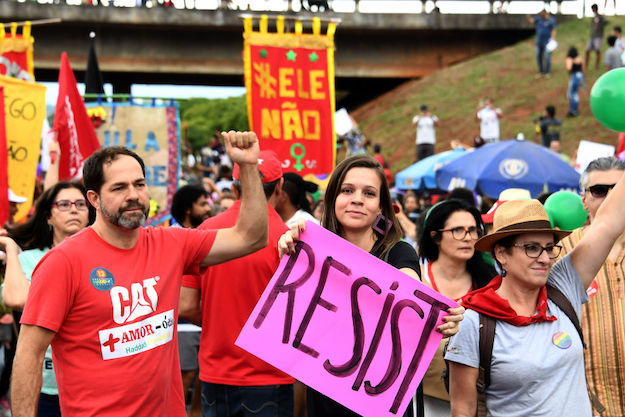
Demonstrators take part in a protest against Brazilian right-wing presidential candidate Jair Bolsonaro, called by a social media campaign under the hashtag #EleNao (Not Him), in Brasilia on October 20, 2018. (Photo by EVARISTO SA / AFP)
https://www.americasquarterly.org/content/brazilians-study-anti-trump-playbook-fight-bolsonaro
BY OLIVER STUENKEL | DECEMBER 13, 2018
Fearing the erosion of democracy, Brazilian journalists, opposition politicians, academics and NGOs try to learn from their counterparts in the U.S.
As promised, Jair Bolsonaro has made emulating and moving closer to the Trump administration the guiding principle of Brazil’s new foreign policy. When Bolsonaro’s son Eduardo, a powerful politician in his own right, visited Washington last month, he proudly wore a “Trump 2020” hat. Domestically, too, Bolsonaro’s strategists closely study the rhetoric and policies adopted by Donald Trump, John Bolton and Steve Bannon, and already act accordingly – for example by circumventing traditional media, embracing nationalism, attacking the judiciary, or promising a return to past glory.
Yet Bolsonaro and his supporters are not the only ones who are looking to the United States for inspiration. Many of his critics have also begun to feverishly study U.S. politics to figure out what they can learn from their North American counterparts when it comes to protecting democracy and resisting a populist leader with authoritarian instincts.
Brazilian journalists frequently discuss how traditional newspapers such as the New York Times have thrived under a president who systematically lashes out against the media. In Brazil, by contrast, some journalists already privately complain about editors discouraging them from criticizing the incoming government. Brazilian academics returning from conferences in the United States cannot help but marvel how debates at U.S. universities are as vibrant as ever, without any hint that free speech may be at risk. Back at home, in comparison, a video in which Bolsonaro reads out the names of eight academics and accuses them of promoting the ideologies of countries like North Korea and Cuba caused shivers in Brazil’s academic community. A growing number of Brazilian government employees have taken to deleting their social media accounts for fear of being punished for past comments critical of the president-elect.
In politics and political activism, too, many observers in Brazil analyzed the U.S. midterm elections in unprecedented detail – for example discussing ways in which the strategies of Alexandria Ocasio-Cortez, Ilhan Omar and Ayanna Pressley, all candidates representing minorities, could be applied at home. In the same way, initiatives such as Black Lives Matter, Indivisible and the 2017 Women’s March inspire many Brazilian activists.
All this shows that, contrary to what many (myself included) expected back in 2016, U.S. soft power – i.e., its attractiveness to outside observers – remains, in many ways, unaffected by Trump. In fact, in some respects, the U.S. president has made the country even more appealing. A Brazilian political activist who frequently criticizes U.S. foreign policy recently told me he was “amazed by how U.S. civil society responded to Trump – definitely a model for us.”
Studying the anti-Trump playbook is no doubt interesting in a moment when Brazilian democracy faces its..
Read full article here.








